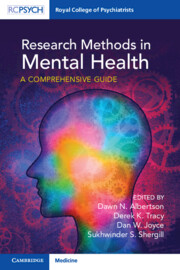Book contents
- Research Methods in Mental Health
- Reviews
- Research Methods in Mental Health
- Copyright page
- Contents
- Contributors
- Foreword
- Foreword
- Section 1 Principles of Research
- Chapter 1 The Foundations
- Chapter 2 Principles of Open Science
- Chapter 3 Writing Up Research
- Chapter 4 Equity, Diversity, and Inclusion in Academic Careers and Research
- Chapter 5 Changing Times – Patient and Public Involvement in Research
- Section 2 Tools and Methodologies
- Section 3 Contemporary Applications
- Index
- References
Chapter 1 - The Foundations
from Section 1 - Principles of Research
Published online by Cambridge University Press: 31 October 2025
- Research Methods in Mental Health
- Reviews
- Research Methods in Mental Health
- Copyright page
- Contents
- Contributors
- Foreword
- Foreword
- Section 1 Principles of Research
- Chapter 1 The Foundations
- Chapter 2 Principles of Open Science
- Chapter 3 Writing Up Research
- Chapter 4 Equity, Diversity, and Inclusion in Academic Careers and Research
- Chapter 5 Changing Times – Patient and Public Involvement in Research
- Section 2 Tools and Methodologies
- Section 3 Contemporary Applications
- Index
- References
Summary
Research involvement is good for both patients and clinicians. In healthcare organisations that are research active, not only are mortality outcomes better, but clinicians are happier and retention rates better. In this chapter we consider how early career clinicians can involve themselves in research, for the benefit of your clinical practice and your patients. It is important to foster early exposure to research, which also makes further involvement in research a less intimidating venture. The only warning attached to that is that once you’ve had a taste of research involvement, and seen your first publication in print, you may find it hard to leave it behind! Establishing research skills early in one’s career can have advantages; firstly, it encourages critical thinking on how to approach any patient, their presenting difficulties and the selection of appropriate interventions. Further, being able to appraise the expanding and complex (and often contradictory) evidence base is a vital skill any clinician will utilise throughout their career. Finally, it is, or can be, enormous fun!
Information
- Type
- Chapter
- Information
- Research Methods in Mental HealthA Comprehensive Guide, pp. 1 - 14Publisher: Cambridge University PressPrint publication year: 2025
References
Further Reading
References
Accessibility standard: WCAG 2.0 A
Why this information is here
This section outlines the accessibility features of this content - including support for screen readers, full keyboard navigation and high-contrast display options. This may not be relevant for you.Accessibility Information
Content Navigation
Allows you to navigate directly to chapters, sections, or non‐text items through a linked table of contents, reducing the need for extensive scrolling.
Provides an interactive index, letting you go straight to where a term or subject appears in the text without manual searching.
Reading Order & Textual Equivalents
You will encounter all content (including footnotes, captions, etc.) in a clear, sequential flow, making it easier to follow with assistive tools like screen readers.
You get concise descriptions (for images, charts, or media clips), ensuring you do not miss crucial information when visual or audio elements are not accessible.
Visual Accessibility
You will still understand key ideas or prompts without relying solely on colour, which is especially helpful if you have colour vision deficiencies.
Structural and Technical Features
You gain clarity from ARIA (Accessible Rich Internet Applications) roles and attributes, as they help assistive technologies interpret how each part of the content functions.
